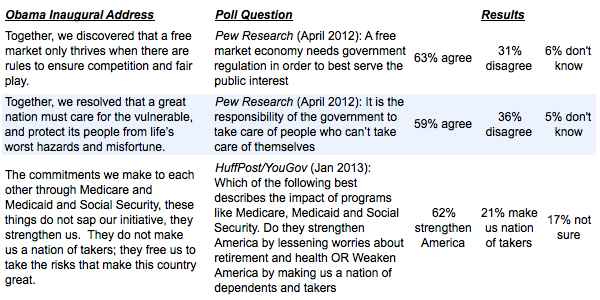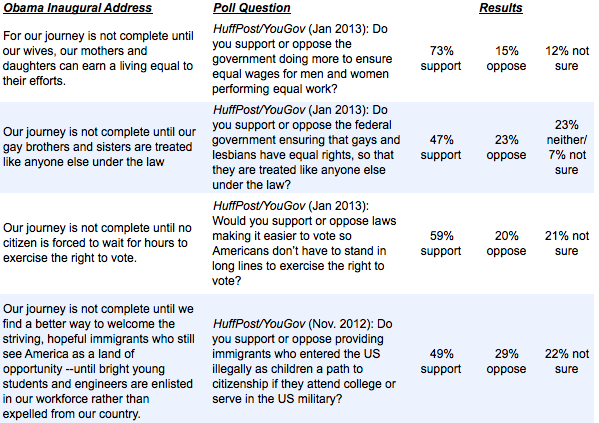WASHINGTON -- President Barack Obama's inaugural address may have irritated conservatives as much as it thrilled liberals, but opinion polling shows that most Americans agree with both the rhetoric and the substance of the most potentially combative lines in the speech.
Observers of all stripes appear to agree that the president used his inaugural address to advance a progressive point of view. Liberals and conservatives had very different reactions, as they often do, but some on the right were especially irked.
"Agree with me or you are un-American" is the way Republican political consultant Dan Hazelwood heard it, according to a tweet from The Washington Post's Chris Cillizza.
While that particular reading of Obama's attempt to ground his arguments in the Constitution and the views of the nation's founders may be a stretch, it raises a fundamental question: Just how many Americans agree with Obama on the more "progressive" positions he advanced in the speech?
A review of recent polling as well as a set of questions asked on a new HuffPost/YouGov online poll show that more Americans agree than disagree with the president on key issues -- in most cases, by large majorities.
The inaugural speech opened, for example, with a defense of a progressive approach to both market regulation and social insurance programs (like Medicare, Medicaid and Social Security) -- what conservative columnist Charles Krauthammer called "an ode to the collectivity." Polls both new and old show that between 59 percent and 63 percent of Americans agree with Obama on three passages in which he defended activist government most clearly.

In particular, a HuffPost/YouGov online poll conducted this week shows that most agree with Obama that programs like Medicare, Medicaid and Social Security "strengthen America by lessening worries about retirement and health" (62 percent) rather than "weaken America by making us a nation of dependents and takers" (21 percent).
Of course, as with many aspects of opinion on public policy, these attitudes coexist with conflicting sentiments. For example, one Pew Research survey found that while 63 percent support government regulation "to best serve the public interest," 57 percent think that "government regulation of business usually does more harm than good." While 59 percent agree that government has a responsibility to "take care of people who can't take care of themselves," 71 percent also say that "poor people have become too dependent on government assistance programs."
Such opposing views create the space for much of our political conflict and help fuel the ongoing gridlock of our divided government. A conservative rejoinder to Obama's philosophy could offer rhetoric that would strike a similarly popular chord. But the underlying point remains: The philosophical defense of liberalism that Obama advanced is something that most Americans agree with.
The public also tends to support the positions that the president pushed on specific issues. On climate change, Obama advocated a response grounded in "the overwhelming judgment of science." Pew Research surveys conducted in 2010 and 2012 show that 67 percent agree that "solid evidence" exists that "the average temperature on earth has been getting warmer," and 65 percent consider it very or somewhat important "for Congress to act" on climate change legislation.

Obama would face a more skeptical audience if he argued that climate change should be his top concern or a higher priority than turning around the economy. A new Pew Research survey released on Thursday found that while 64 percent consider "dealing with global warming" an important priority for the president and Congress, just 28 percent consider it the "top priority." Global warming was the lowest rated of 21 suggested priorities, scoring far below strengthening the economy (86 percent) and improving the job situation (79 percent).
Toward the end of the address, Obama committed to action on immigration, gay rights, gender equality and electoral reform aimed at easing long lines at polling places. Again, the rhetoric of the speech largely meets with wide support, as a series of HuffPost/YouGov poll results show.

Backing of Obama's positions on gay rights and immigration falls just below the majority level, but in both cases, support is far greater than opposition. Just less than half (47 percent) favor "ensuring that gays and lesbians have equal rights, so that they are treated like anyone else under the law," while 23 percent say they're opposed. Slightly more (49 percent) support "providing immigrants who entered the US illegally as children a path to citizenship if they attend college or serve in the US military," while 29 percent oppose it.
Popular counterarguments to the president's views also exist. On immigration, for example, a Pew Research poll conducted in April 2012 found that 69 percent of Americans agree "we should restrict and control the number of people coming to live in our country more than we do now."
On same-sex marriage, most polls show a "slim majority" supporting Obama's position, as The New York Times' Micah Cohen put it.
Similarly, while the HuffPost/YouGov poll showed only 20 percent willing to oppose efforts to reduce long lines at polling places, opinion was more divided on a second question] as to whether voting should be made easier "to reduce long lines" (44 percent) or harder "to prevent voter fraud" (41 percent).
These polling data leave much room for debate about specific policies, but they make clear -- despite the argument in some circles that the president's tone was excessively partisan or political -- that, in fact, Obama's rhetoric fell on responsive ears.
The latest HuffPost/YouGov poll was conducted Jan. 22-23 among 1,000 U.S. adults. The poll used a sample selected from YouGov's opt-in online panel to match the demographics and other characteristics of the adult U.S. population. Factors considered include age, race, gender, education, employment, income, marital status, number of children, voter registration, time and location of Internet access, interest in politics, religion and church attendance. Additional crosstabs for the poll are available here.
The Huffington Post has teamed up with YouGov to conduct daily opinion polls. You can learn more about this project and take part in YouGov's nationally representative opinion polling.

